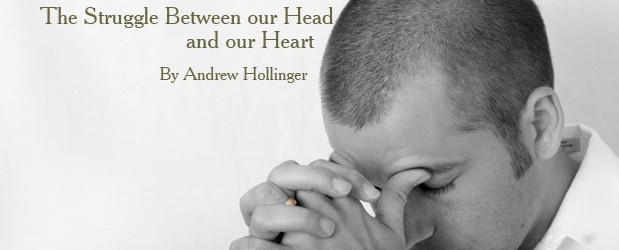breaking news
The Struggle Between our Head and Our Heart
June 25th, 2013 | by valleychristian
 0
0

Writers must be expert raconteurs and amateur everything else. I found this particularly true last year: I wrote a novel to fulfill the requirements of my MFA. The story is about Harvey, a middle-aged, terminally ill man who feels intense and near-paralyzing guilt about an event in his past. Or at least I thought he felt guilty.
I had to learn about guilt, the deep, oppressive, life-changing kind. Studying guilt led me to learn about wrongness and regret, shame and vulnerability. And then I understood that Harvey didn’t feel guilty. He was ashamed.
Brené Brown, a researcher at the University of Houston specializing in vulnerability and shame, says that guilt is a healthy response to having done something wrong. Guilt drives us to apologize, to make amends; it helps us learn from our mistakes and misdeeds. Feeling guilty when we do something hurtful, then, is part of being a mentally and emotionally healthy person. Here’s the thing: guilt is fleeting. Even though we may remember the incident for some time, perhaps with twinges of regret, if we have made amends, the guilt fades.
Although Harvey did feel driven, constantly driven, to make up for his past wrong, his feelings of guilt seeped into his life, so much so that nearly everything he did was informed by this one wrong. (I’m not explaining what Harvey’s perceived misdeed was because, in the book, the reader doesn’t find out until the last chapter — it’s not important what Harvey’s wrong was, only that he continually suffers from having done it.) That’s shame.
Shame is that nagging doubt that we’re not good enough and never will be good enough. It forces us to live and relive, like some horrible edition of This Is Your Life, every rotten moment we’ve ever had. For Harvey, this meant that no matter how awesome he was, how many good deeds he did, or the joy he may have brought other people, he wasn’t able to overcome his wrong. In fact, for Harvey, his shame was how he knew he was paying for his misdeed. As long as he felt bad about it, he felt justice was being served. It’s a kind of addiction (atonement addiction?).
But there’s more. In the story, Harvey is a Christian. He believes, at least academically, that God forgives him (or would, if he would ask for it). Harvey’s emotions get in the way, those feelings of yes, God forgives, but certainly not for this; I mean this was absolutely awful.
At the end of the book, when the reader discovers the nature of Harvey’s wrongdoing, the reader gets to decide whether Harvey was too hard on himself or his self-torture was justified. That’s one of those gambits that make a book “literary.” Beyond that, though, it was important for me to write Harvey this way, as a Christian struggling with shame, because I think that’s very real. Becoming a Christian and learning about God’s love and forgiveness is a life-changing moment. Then that all-too-human side pops up again, though, reminding us that we’re not good enough.
So we go to Sunday school and Bible study and say that God’s forgiveness is available if we just take it (“If we confess our sins, he is faithful and just to forgive us our sins and to cleanse us from all unrighteousness.” 1 John 1:19). Then we come home and secretly think Well, for everybody else. Not me. I’m actually too wrong. God is “just,” and so I’ll wait for my “just” desserts. It’s the struggle between our heads and our hearts. The Bible tells us that “all have sinned and fall short of the glory of God” (Romans 3:23) and that God “will have compassion on us; [He] will tread our sins underfoot and hurl our iniquities into the depths of the sea” (Micah 7:19). The heart wants to believe and the head asks but how?
Is it OK to talk about our struggles as Christians? We talk about temptations. We talk about being lukewarm. We talk about our moments of doubt. Can we talk about our shame? I think we have to. Otherwise, that nagging feeling that we’re not good enough, will never be good enough gets louder and more insistent, until its all we can hear. And then we believe it.




